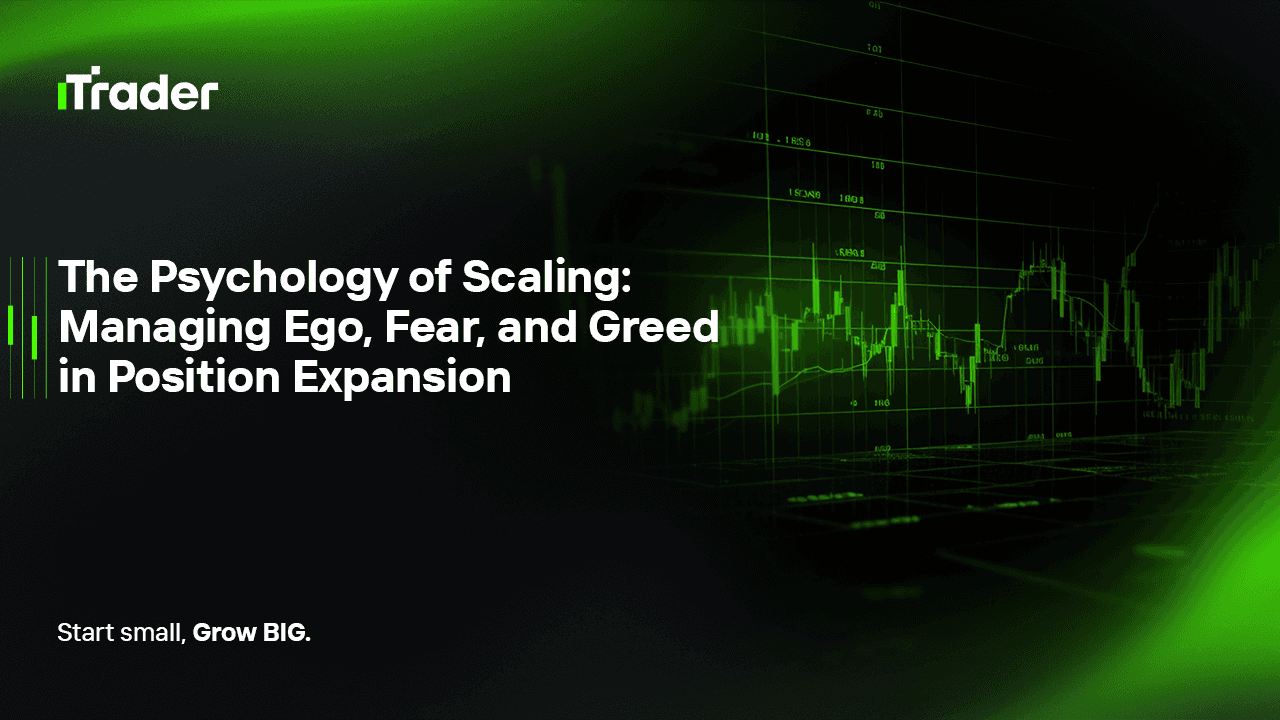2025-10-30
In prop trading, scaling—the art of increasing or reducing position size as a trade develops—is more than a technical skill. It’s a direct reflection of a trader’s inner world: ego, fear, greed, and self-control.

When done right, scaling amplifies returns while maintaining balance with risk. When done wrong, it exposes the fragile core of a trader’s psychology—where overconfidence, impatience, and denial quietly sabotage performance.
Scaling, at its essence, isn’t about maximizing profit. It’s about mastering the emotional geometry between conviction and control.
Scaling can take several forms:
From a psychological standpoint, each action represents a different emotional state:
The key is not just knowing when to scale, but why you’re scaling. Every decision must come from a system, not from the mind’s emotional volatility.
Ego is the most seductive driver in position expansion. It whispers:
“You’re right—double down.”
“You saw this coming—go bigger.”
When traders experience a string of wins, their ego inflates. The market starts to feel predictable. This illusion of control encourages reckless scaling—adding size simply to validate identity, not strategy.
Ego-driven scaling often shows up as:
In prop trading, where daily drawdown and max loss are strict, ego can destroy accounts faster than poor technicals. The cure is humility through data—objective, statistical feedback that overrides personal narratives.
Fear is the counterbalance to ego, but it’s equally destructive when unmanaged.
Common manifestations of fear in scaling:
Fear-based behavior stems from a loss-anchored mindset: the trader remembers past pain more vividly than future potential.
In prop environments, where psychological pressure is constant, fear narrows perception. The trader stops trading the market and starts trading their memory.
To manage fear, a trader must reconnect with process logic:
Greed is often mistaken for ambition. But where ambition seeks mastery, greed seeks immediate gratification.
In scaling, greed manifests when:
Greed amplifies volatility—not just in the market, but in the trader’s emotions.
It shifts attention from process-based execution to outcome-based obsession.
The antidote to greed is discipline through structure:
Ego, fear, and greed rarely appear in isolation—they form a self-reinforcing cycle:
Breaking this cycle requires self-awareness in real time. Prop traders who survive long-term are not those who eliminate emotion, but those who can observe emotion without obeying it.
A robust scaling framework provides emotional safety. It transforms impulsive reactions into mechanical decisions.
Example framework:
This method creates bounded flexibility—enough room to capitalize on momentum, but strict enough to prevent emotional overreach.
By embedding psychological control into quantitative rules, the trader ensures that scaling becomes an extension of structure, not ego.
Before adding to any position, ask:
This self-dialogue keeps the conscious mind in control. It turns impulsive moments into reflective pauses—the difference between a disciplined trader and an emotional one.
Prop firms impose strict limits—max daily loss, overall drawdown, and profit targets. These constraints amplify the psychological tension behind scaling.
This paradox pressures traders into emotional decision-making. The solution is risk normalization:
When scaling becomes a function of system logic, not ambition, your prop account’s longevity multiplies.
Professional scaling requires emotional neutrality—the ability to engage fully with the market while remaining detached from the outcome.
This is cultivated through:
With time, the trader learns to interpret scaling opportunities as data events, not emotional triggers.
Scaling is not about adding more lots—it’s about adding more clarity.
Every position expansion magnifies not only your potential profit but also your psychological weaknesses.
To scale effectively in the prop firm environment, you must:
Ultimately, the art of scaling lies in psychological symmetry:
Confidence without arrogance.
Caution without paralysis.
Ambition without overreach.
A trader who can balance these forces doesn’t just scale positions—they scale themselves.
2025 Ай Трейдер Глобал ХХК | Компанийн бүртгэлийн дугаар: 15962
Ай Трейдер Глобал ХХК нь Комор улсын Анжуан арал дахь Мутсамуду хотын Хамчакод байрлалтай. Тус компани нь Коморын Үнэт Цаасны Хорооноос (Securities Commission of the Comoros) олгосон L15962/ITGL дугаартай тусгай зөвшөөрлийн хүрээнд үйл ажиллагаа явуулдаг.
Ай Трейдер Глобал ХХК нь “iTrader” нэрийн дор үйл ажиллагаа явуулдаг бөгөөд (Форекс) арилжааны үйл ажиллагаа явуулах эрхтэй. Компанийн лого, барааны тэмдэг, вэбсайт нь зөвхөн Ай Трейдер Глобал ХХК компанийн өмч юм.
Ай Трейдер Глобал ХХК -ийн охин компани болох : iTrader Global Pty Ltd, Австралийн компанийн бүртгэлийн дугаар (ACN): 686 857 198. Энэ компани нь Opheleo Holdings Pty Ltd компанийн албан ёсны төлөөлөгч бөгөөд Австралийн санхүүгийн үйлчилгээний төлөөлөгчийн дугаар: 001315037 -тай. Австралийн санхүүгийн үйлчилгээний лицензийн дугаар: 000224485 -тай Level 1, 256 Rundle St, Adelaide, SA 5000 хаягт байршдаг. Анхааруулга: Энэ байгууллага нь энэхүү вэбсайт дээр болон дамжуулан арилжаалагдаж буй санхүүгийн (арилжааны) хэрэгсэл нийлүүлэгч биш бөгөөд ямар нэгэн хариуцлага хүлээхгүй болно.
Эрсдэлийн сэрэмжлүүлэг: CFD арилжааны хөшүүргийн улмаас хөрөнгөө хурдан алдах өндөр эрсдэлтэй тул бүх хэрэглэгчдэд тохиромжгүй байдаг.
Фанд, CFD болон бусад өндөр xөшүүрэгтэй арилжаа нь хэрэглэгчээс нарийн төвөгтэй ойлголтуудын талаар тусгай мэдлэг шаарддаг. Хөшүүрэгтэй арилжаанд оролцогчдын 84.01% нь алдагдал хүлээдгийг судалгаанууд харуулдаг тул хөшүүрэгтэй арилжаанд орохоос өмнө хөрөнгөө алдах маш өндөр эрсдэлтэй болохыг анхаарна уу.
iTrader нь аливаа иргэн, хуулийн этгээдийн өмнө xөшүүрэгтэй арилжааны эрсдэл, алдагдал, бусад хохирлыг бүхэлд нь хариуцахгүй болохыг мэдэгдэж байна.
Энэхүү веб сайтын мэдээ, мэдээлэл нь зөвхөн мэдлэг түгээх зорилготой тул хэрэглэгч та бие даан шийдвэр гаргана уу.
Хязгаарлалт: iTrader нь вэбсайт болон үйлчилгээгээ тухайн орны хууль тогтоомж, дүрэм журмаар хориглосон орнуудад оршин суугчдад чиглүүлдэггүй. Хэрэв та энэхүү вэбсайтыг ашиглахыг хориглосон оронд байгаа бол вэбсайт болон үйлчилгээг ашиглахдаа тухайн орны хууль тогтоомжид нийцэж байгаа эсэхийг шалгах үүрэгтэй. iTrader нь вэбсайтынхаа мэдээлэл бүх оронд тохиромжтой эсэхийг баталгаажуулдаггүй.
Ай Трейдер Глобал ХХК нь зарим улс орны иргэдэд үйлчилгээ үзүүлэхээс татгалздаг болно. Жишээлбэл: АНУ, Орос, Бразил, Канада, Израйл, Иран.